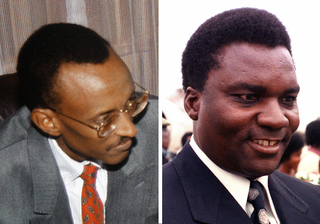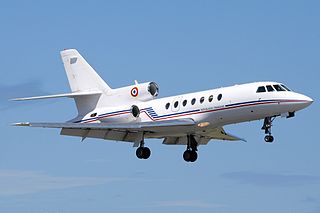Related Research Articles

Rwanda is a de facto one-party state ruled by the Rwandan Patriotic Front and its leader Paul Kagame since the end of the 1994 genocide against members of the Tutsi ethnic group. Although Rwanda is nominally democratic, elections are manipulated in various ways, which include banning opposition parties, arresting or assassinating critics, and electoral fraud.

Juvénal Habyarimana was a Rwandan politician and military officer who was the second president of Rwanda, from 1973 until his assassination in 1994. He was nicknamed Kinani, a Kinyarwanda word meaning "invincible".

Paul Kagame is a Rwandan politician and former military officer who has been the President of Rwanda since 2000. He was previously a commander of the Rwandan Patriotic Front (RPF), a rebel armed force which invaded Rwanda in 1990. The RPF was one of the parties of the conflict during the Rwandan Civil War and the armed force which ended the Rwandan genocide. He was considered Rwanda's de facto leader when he was Vice President and Minister of Defence under President Pasteur Bizimungu from 1994 to 2000 after which the vice-presidential post was abolished.

The Rwandan Patriotic Front is the ruling political party in Rwanda.

The Rwandan genocide, also known as the genocide against the Tutsi, occurred between 7 April and 19 July 1994 during the Rwandan Civil War. During this period of around 100 days, members of the Tutsi minority ethnic group, as well as some moderate Hutu and Twa, were killed by armed Hutu militias. Although the Constitution of Rwanda states that more than 1 million people perished in the genocide, the demographic evidence suggests that the real number killed was likely lower. The most widely accepted scholarly estimates are around 500,000 to 662,000 Tutsi deaths.

Elections in Rwanda are manipulated in various ways, which include banning opposition parties, arresting or assassinating critics, and electoral fraud. According to its constitution, Rwanda is a multi-party democracy with a presidential system. In practice, it functions as a one-party state ruled by the Rwandan Patriotic Front and its leader Paul Kagame. The President and majority of members of the Chamber of Deputies are directly elected, whilst the Senate is indirectly elected and partly appointed.

The Rwandan Civil War was a large-scale civil war in Rwanda which was fought between the Rwandan Armed Forces, representing the country's government, and the rebel Rwandan Patriotic Front (RPF) from 1 October 1990 to 18 July 1994. The war arose from the long-running dispute between the Hutu and Tutsi groups within the Rwandan population. A 1959–1962 revolution had replaced the Tutsi monarchy with a Hutu-led republic, forcing more than 336,000 Tutsi to seek refuge in neighbouring countries. A group of these refugees in Uganda founded the RPF which, under the leadership of Fred Rwigyema and Paul Kagame, became a battle-ready army by the late 1980s.
Linda Melvern is a British investigative journalist. Early in her career, she worked for The Evening Standard and then The Sunday Times (UK), including on the investigative Insight Team. Since leaving the newspaper she has written seven books of non-fiction. She is a former Honorary Professor of the University of Wales, Aberystwyth, in the Department of International Politics.

On the evening of 6 April 1994, the aircraft carrying Rwandan president Juvénal Habyarimana and Burundian president Cyprien Ntaryamira, both Hutu, was shot down with surface-to-air missiles as their jet prepared to land in Kigali, Rwanda; both were killed. The assassination set in motion the Rwandan genocide, one of the bloodiest events of the late 20th century.
Rose Kabuye is a retired Lieutenant Colonel in the Rwandan Army and Until late 2023, she was the highest ranking woman ever to serve in her country's armed forces. She is currently working in the private sector as chief executive officer of Virunga Logistics and Startech Limited but is best known for her work as a fighter for the Rwandan Patriotic Front during the Rwandan Civil War. She subsequently became Mayor of Kigali City, Rwandan Chief of State Protocol, and a member of the Rwandan parliament. Because of her participation in the liberation struggle, she was awarded The Rwandan National Liberation Medal and the Campaign Against Genocide Medal. She was serving as the chief of protocol of Rwandan President Paul Kagame in November 2008 when she was arrested in Frankfurt, Germany on charges that were lifted in March 2009.

Victoire Ingabire Umuhoza is a Rwandan politician who served as chairwoman of the Unified Democratic Forces from 2006 to 2019. As an advocate for democracy and critic of President Paul Kagame, she was the UDF's candidate for the Rwandan 2010 presidential elections, but was ultimately arrested and sentenced to prison. A Sakharov Prize nominee, she served 8 years of a 15-year prison sentence in Kigali Central Prison on charges of terrorism and threatening national security. She currently leads the party Development And Liberty For All, with the focus to campaign for more political space and for development.

Patrick Karegeya was a head of intelligence in Rwanda. He was a member of the Rwandan Patriotic Front (RPF) group that took power in Rwanda following the genocide against Tutsi. After becoming a critic of RPF leader Paul Kagame, he was stripped of his rank and jailed. Following a time in exile, he was assassinated in Johannesburg, South Africa on December 31, 2013.
Rwandan genocide denial is the pseudohistorical assertion that the Rwandan genocide did not occur, specifically rejection of the scholarly consensus that Rwandan Tutsis were the victims of genocide between 7 April and 19 July 1994. The perpetrators, a small minority of other Hutu, and a fringe of Western writers dispute that reality.

The role of France in the 1994 genocide against the Tutsi has been a source of controversy and debate both within and beyond France and Rwanda. France actively supported the Hutu-led government of Juvénal Habyarimana against the Tutsi-dominated Rwandan Patriotic Front, which since 1990 had been engaged in a conflict intended to restore the rights of Rwandan Tutsis both within Rwanda and exiled in neighboring countries following over four decades of anti-Tutsi violence. France provided arms and military training to Habyarimana's militias, the Interahamwe and Impuzamugambi, which were among the government's primary means of operationalizing the genocide following the assassination of Juvénal Habyarimana and Cyprien Ntaryamira on April 6, 1994.
Kizito Mihigo was a Rwandan gospel singer, songwriter, organist, composer of sacred music, television presenter, genocide survivor, peace maker and peace and reconciliation activist. Kizito was an iconic activist who dedicated his life to healing the souls of his fellow genocide survivors and rebuilding unity and reconciliation in Rwanda. According to Kisito's words, published on Kizitomihigo.com, he claimed, "The objective of my works is to console and strengthen the wounded hearts, singing peace and forgiveness." His ultimate performance in healing and Peacebuilding started in 2010 when he created the Kizito Mihigo Peace Foundation, a non-profit organization devoted to his cause.
In 1999, Rwanda began its National Unity and Reconciliation Commission (NURC) in order to work towards a reconciliation of the conflicting parties involved in the Rwandan Civil War and the Rwandan genocide, with the eventual goal of reunifying the country’s citizens. The passage of the Government of National Unity Law No. 03/99 provided for the establishment of the National Unity and Reconciliation Commission, which became a permanent body in 2002, and continues its function to the present day. As its name suggests, the Commission is intended to promote unity and reconciliation amongst the former opponents present in the Rwandan population.

In Praise of Blood: The Crimes of the Rwandan Patriotic Front is a 2018 non-fiction book by Canadian journalist Judi Rever and published by Random House of Canada; it has also been translated into Dutch and French. The book describes alleged war crimes by the Rwandan Patriotic Front (RPF), Rwanda's ruling political party, during its ascent to power in the 1990s.
Rwanda: From Genocide to Precarious Peace is a 2018 non-fiction book by Susan Thomson, published by Yale University Press.

Do Not Disturb: The Story of a Political Murder and an African Regime Gone Bad is a 2021 book by British journalist Michela Wrong, published by Fourth Estate and PublicAffairs. The book focuses on the 2014 murder of Rwandan defector Patrick Karegeya, for which the Rwandan government denied responsibility.
Whispering Truth to Power: Everyday Resistance to Reconciliation in Postgenocide Rwanda is a 2013 non-fiction book by Susan Thomson, published by University of Wisconsin Press.
References
- ↑ Congress, The Library of. "LC Linked Data Service: Authorities and Vocabularies (Library of Congress)". id.loc.gov. Retrieved 21 January 2021.
- 1 2 3 4 5 6 7 Mayne, Aleta (July 2014). "Profile: Professor Susan Thomson maintains a cool demeanor despite having lived through heated moments in Africa" . Retrieved 20 January 2021.
- ↑ "Susan Thomson | Colgate University". www.colgate.edu. Retrieved 11 November 2020.
- ↑ CV
- ↑ "Susan M. Thomson" (PDF). Dalhousie University . Retrieved 20 December 2022. - CV
- ↑ "Whispering Truth to Power: Everyday Resistance to Reconciliation in Postgenocide Rwanda". 20 October 2014. Retrieved 11 November 2020.
- ↑ Watkins, Sarah E. (2014). "Whispering truth to power: everyday resistance to reconciliation in postgenocide Rwanda". Canadian Journal of Development Studies / Revue canadienne d'études du développement. 35 (4): 592–593. doi:10.1080/02255189.2014.973840. S2CID 140697253.
- ↑ Oldenburg, S. (2015). "Whispering truth to power: Everyday resistance to reconciliation in postgenocide Rwanda" (PDF). African Affairs. 114 (455): 322–323. doi:10.1093/afraf/adv012.
- ↑ Jessee, Erin (2014). "Review of Whispering Truth to Power: Everyday Resistance to Reconciliation in Postgenocide Rwanda". African Conflict and Peacebuilding Review. 4 (2): 163–166. doi:10.2979/africonfpeacrevi.4.2.163. ISSN 2156-695X.
- 1 2 Salton, Herman T. (2019). "Rwanda: from genocide to precarious peace". International Affairs. 95 (1): 238–239. doi:10.1093/ia/iiy270.
- ↑ Malik, Aditi (2020). "Susan Thomson. Rwanda: From Genocide to Precarious Peace. New Haven: Yale University Press, 2018. xv + 321 pp. Maps. Photographs. Notes. Glossary. Index. $30.00. Cloth. ISBN: 978-0-300-19739-6". African Studies Review. 63 (2): E25–E27. doi: 10.1017/asr.2019.91 .
- ↑ Santoro, Lara; Thomson, Susan (17 June 2014). "Opinion | Why Are Rwandans Disappearing? (Published 2014)". The New York Times. Retrieved 20 January 2021.
- ↑ Mara, Kathryn (2019). "Rwanda: From Genocide to Precarious Peace by Susan Thomson (review)". Africa Today. 66 (2): 145–147. ISSN 1527-1978.
- ↑ "Rwanda: From Genocide to Precarious Peace". ABC Radio National. 1 July 2019. Retrieved 11 November 2020.
- ↑ "Book Review – Rwanda: From Genocide to Precarious Peace". Vanguard Africa. Retrieved 11 November 2020.
- ↑ "Rwanda: From Genocide to Precarious Peace". 28 January 2019. Retrieved 11 November 2020.